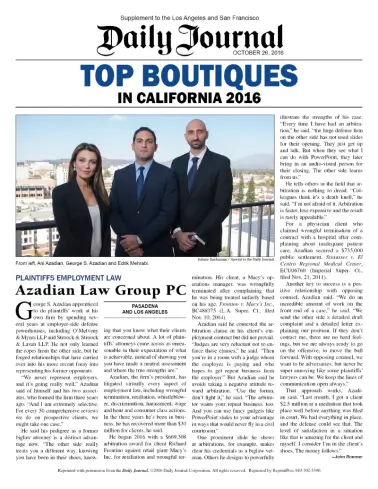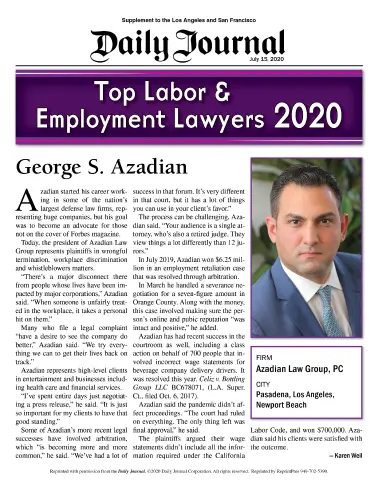What Is A Wrongful Termination in California?
Los Angeles Wrongful Termination Attorney George S. Azadian gives you his insights into wrongful termination: We all have likely heard of “wrongful termination,” but few of us know what actually qualifies as a wrongful termination under California law. In California, employees without an employment contract setting forth the specific reasons as to why they can be terminated are presumed to be “at-will” employees. An “at-will” employee can be terminated at any time and for any reason, so long as the reason is not an illegal one. For instance, it may not be fair or even a good business decision, but an employer may legally terminate an employee in California for having a tattoo, talking too loud, or even being one minute late to work. Those sorts of terminations may be considered unfair in the traditional sense but would not qualify as an illegal “wrongful termination” under California employment law.
That said, California provides employees with some of the nation’s strongest protections against being terminated for an illegal reason. There are dozens, if not hundreds, of illegal reasons that would support a claim for wrongful termination under California law. Although it is best to speak with an employment lawyer to determine if a termination is illegal, here are a few common illegal reasons:
Protected Characteristics
First, it is illegal for an employer to terminate, harass, or discriminate against an employee based on the employee’s “protected characteristics.” Let’s break this down. A “protected characteristic” includes an employee’s:
- Gender
- Race, color, or national origin
- Age
- Pregnancy
- Religion
- Disability or medical condition
- Marital status
- Veteran/military status
- Gender identity or gender expression
For example, terminating an employee because she is pregnant or disabled would qualify as employment discrimination and wrongful termination. This rule goes further to include an employee’s association with someone based on that other person’s protected characteristics. In other words, an employer cannot take adverse action against an employee because a person close to them (child, spouse, etc.) is a member of a protected class. For example, it would be disability discrimination and wrongful termination to terminate an employee because his wife became pregnant or is disabled.
Protected Activities
Second, an employer cannot terminate, harass, or discriminate against an employee in retaliation for the employee engaging in a “protected activity.” A protected activity can be a number of things, including:
- Complaining about being harassed, discriminated, or retaliated against due to a protected characteristic
- Discussing or disclosing wages or compensation with co-workers
- Complaining about not being paid wages properly under the law, such as complaining about missing overtime pay or missing meal/rest breaks
- Complaining about workplace safety and conditions
- Complaining or advocating for patient safety and care
- Taking medical leave protected by the California Family Rights Act or the federal Family Medical Leave Act (CFRA/FMLA)
- Taking time off for jury duty
- Engaging in political activity of the employee’s choice on the employee’s own time
For example, it would be illegal retaliation and wrongful termination if an employer terminated an employee because that employee complained she was being treated differently because she was a female. It would also be an illegal wrongful termination to terminate an employee for attending a political rally on his or her own time. It would also be illegal retaliation and wrongful termination to terminate an employee for taking medical leave.
Whistleblowers
Lastly, it is illegal for an employer to terminate, harass, retaliate, or discriminate against an employee due to that employee refusing to violate a law, complaining about the employer violating the law, or reporting the employer to various government agencies, such as the Equal Employment Opportunity Commission (EEOC), Department of Labor (DOL), or Occupation Safety & Health Administration (OSHA).
Along with that, it is illegal for an employer to take adverse action against an employee for reporting an activity that the employee is required to report (for example, a nurse reporting patient abuse) or for reporting an activity which appears to the employee to be illegal. The reporting may be internal (such as human resources, a manager, or someone in the company) or to a government agency. Employees who make these complaints are sometimes referred to as “whistleblowers.”
For example, it would be illegal to terminate an employee for refusing to engage in fraudulent billing practices or testifying on behalf of another employee who was discriminated against. It is important to note that even if the activity is found not to be illegal, the employee is still protected so long as he or she reasonably believes the activity to be illegal at the time of reporting.
Keep in mind that it is nearly always the case that an employer will claim the reason was a legitimate one (such as downsizing or the employee’s performance). However, employment lawyers representing employees win cases by proving that the employer’s reason was really a lie to cover the true illegal reason for the firing. This can be achieved in a number of ways, such as showing that other employees who do not have the protected characteristic were subjected to better treatment or that the termination occurred shortly after the employee engaged in a protected activity. So, despite the common belief that at-will employees can be terminated at any time and for any reason, these employees are highly protected, and employers would be foolish to believe that they can get away with terminating an employee for one of these illegal reasons.
In this piece, Pasadena attorney George S. Azadian gives you his insights into wrongful termination. This article is for general information purposes only and is not presented as legal advice, and is not to be acted on as such.
To speak with an employment lawyer, contact the Azadian Law Group, PC, at 626-449-4944 (Ext. 5027 for after-hours calls) or email our firm to schedule a free case evaluation.
From their offices located in the heart of Pasadena (at 790 East Colorado Blvd., Pasadena), the employment law firm provides legal services exclusively to employees throughout California, including the cities of Pasadena, Los Angeles, Glendale, Santa Monica, Hollywood, Fontana, Burbank, Anaheim, Orange, Riverside, San Bernardino, San Diego, and Ventura.
_______________________________________________________________________
This article was originally published in the online magazine Pasadena Now (on June 3, 2016).
Related Blog Posts
Hollywood headlines are buzzing again—but this time, it's not about a blockbuster premiere. On June 3, 2025, a Los Angeles...
Read MoreSomething unexpected hit the news cycle in March 2025—and it’s got a lot of people talking. A man named Christopher...
Read MoreImagine dedicating years of your life to a mission-driven organization, only to be pushed out the moment you raise concerns....
Read MoreTypes of Cases Handle By Employment Lawyers in Los Angeles, CA
The following presents an overview of the broad range of employment law cases that our employment attorneys are experienced at overseeing and favorably resolving.
Wrongful Termination
Wrongful Termination Lawyers in Los Angeles, CA Attorneys at Azadian Law Group who have filed wrongful termination lawsuits acknowledge that unfair termination can significantly impact an employee’s life. It can…
Age Discrimination
Age Discrimination Lawyers in Los Angeles, CA Azadian Law Group, PC regularly represents clients throughout Los Angeles, CA, who are the victims of age discrimination in the workplace. At Azadian…
Pregnancy Discrimination
Pregnancy Discrimination Lawyer in Los Angeles, CA At Azadian Law Group, PC, our pregnancy discrimination lawyer in Los Angeles, regularly represents clients who are the victims of pregnancy discrimination in…
Sexual Harassment
Sexual Harassment Attorney in Los Angeles, CA The Los Angeles Sexual Harassment Lawyers at Azadian Law Group, PC, know that in today’s modern era, some people often make the mistake of…
Racial Discrimination
Racial Discrimination Lawyers in Los Angeles, CA Azadian Law Group, PC regularly represents clients throughout Los Angeles who are the victims of racial discrimination at work. The Los Angeles Race…
Disability Discrimination
Disability Discrimination Attorneys in Los Angeles, CA There is a misconception that disabled people do not want to work or that disabled individuals simply cannot or will not be as…
Praise from Our Clients
Who We Represent
At Azadian Law Group, we are dedicated to upholding the rights and interests of employees in the workplace. Our expertise in employment law positions us as staunch advocates for those facing unjust treatment in their professional environments.
Whether combating workplace discrimination, addressing unfair termination, or negotiating equitable compensation, our team is committed to ensuring that every employee we represent is treated fairly and respectfully under the law.

Step 1
Explore our comprehensive range of legal services to find the specialized support you need.
Step 2
Arrange a free initial meeting with our experts to discuss your legal situation.
Step 3
Receive a custom strategy specially created for your case by our legal experts.
Call Us Now 213-229-9031
Tell Us Your Story
Speak out for justice. Your story can be the start of a new chapter of workplace fairness.




